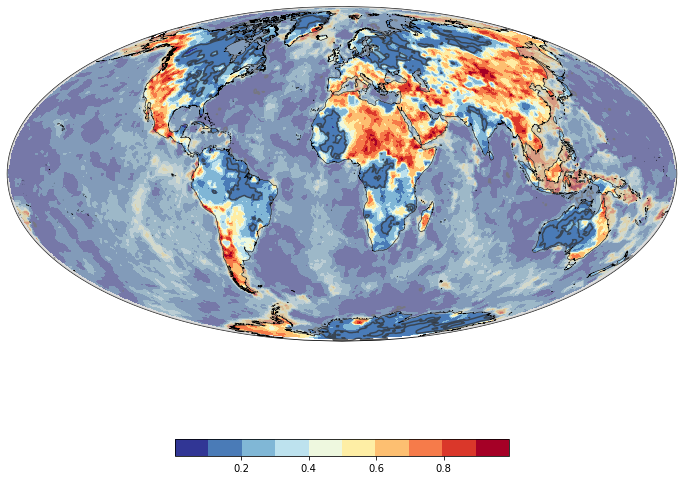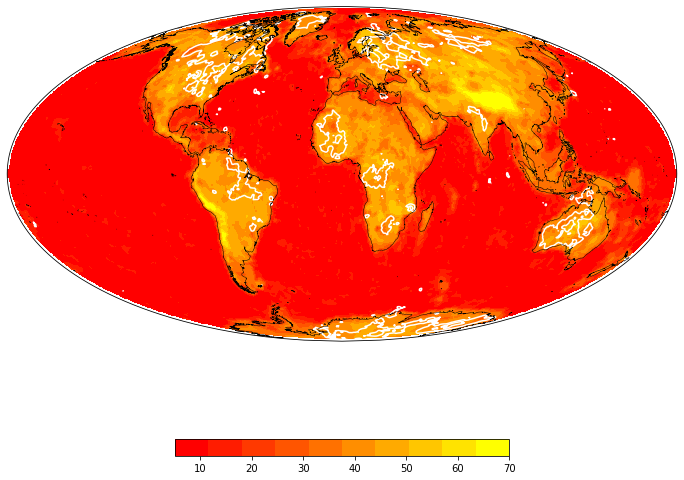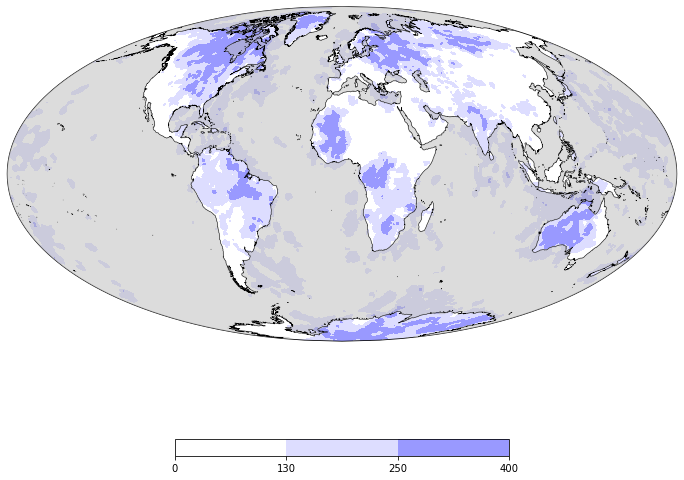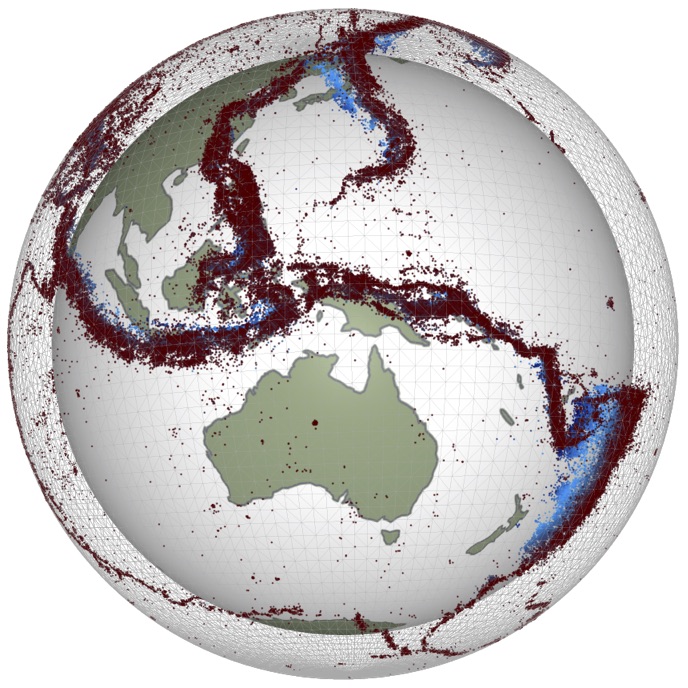Introduction to the stripy/python wrapper for litho 1.0
Contents
Introduction to the stripy/python wrapper for litho 1.0¶
Litho 1.0 is a global model of lithospheric properties that builds upon Crust 1.0. The original model was computed on an icosohedral triangulation (40962 points) and supplied with a C++ code to retrieve model information at any single lon, lat, depth location. To plot a map using Litho 1.0 data, numerous queries of the model are required for which repeated calls to the C++ code can be inefficient.
Using stripy to recreate the triangulation and provide interpolation through a (vectorised) numpy interface makes these queries straightforward. We provide these examples along with the
litho1pt0 source code to demonstrate a specific applicationo of the stripy wrapper.
Format for litho 1.0¶
Litho 1.0 is supplied as a series of depths at each of the points of the triangulation. These layers represent distinct components of the lithospheric column that may not
be present everywhere. For efficiency of implementation, we have pre-processed the model to include all layers at every point but with zero thickness where any given layer is absent. This allows us to create global maps of layer depth or thickness using numpy arrays.
Below the lithosphere, the model blends seamlessly into a 1d Reference model (REF) which we do not include in this interface as it requires none of the triangulation and interpolation
capability of stripy.
References¶
Pasyanos, M. E., T. G. Masters, G. Laske, and Z. Ma (2014), LITHO1.0: An updated crust and lithospheric model of the Earth, Journal of Geophysical Research-Solid Earth, 119(3), 2153–2173, doi:10.1002/2013JB010626.
Laske, G., G. Masters, and Z. Ma (2013), Update on CRUST1. 0—A 1-degree global model of Earth’s crust, Geophys Research Abstracts, 15, EGU2013–2658.
import litho1pt0 as litho
from pprint import pprint
import numpy as np
litho._interpolator.npoints
40962
print(" Layer keys \n")
pprint( litho.l1_layer_decode.items() )
print("\n Value keys \n")
pprint( litho.l1_data_decode.items() )
Layer keys
odict_items([('ASTHENO-TOP', 0), ('LID-BOTTOM', 1), ('LID-TOP', 2), ('CRUST3-BOTTOM', 3), ('CRUST3-TOP', 4), ('CRUST2-BOTTOM', 5), ('CRUST2-TOP', 6), ('CRUST1-BOTTOM', 7), ('CRUST1-TOP', 8), ('SEDS3-BOTTOM', 9), ('SEDS3-TOP', 10), ('SEDS2-BOTTOM', 11), ('SEDS2-TOP', 12), ('SEDS1-BOTTOM', 13), ('SEDS1-TOP', 14), ('WATER-BOTTOM', 15), ('WATER-TOP', 16), ('ICE-BOTTOM', 17), ('ICE-TOP', 18)])
Value keys
odict_items([('DEPTH', 0), ('DENSITY', 1), ('VP', 2), ('VS', 3), ('QKAPPA', 4), ('QMU', 5), ('VP2', 6), ('VS2', 7), ('ETA', 8)])
lats = np.array([0,10,20])
lons = np.array([0,0,0])
litho.layer_depth(lats,lons, layerID='ASTHENO-TOP')
array([ 60245. , 273883.83336101, 122772.4301943 ])
## make a global raster of some quantity
lonv, latv = np.meshgrid(np.linspace(-180,180,720), np.linspace(-89,89,356), sparse=False, indexing='xy')
l1 = litho.layer_depth(latv, lonv, "LID-BOTTOM")
l2 = litho.layer_depth(latv, lonv, "LID-TOP")
lthickness = (l1 - l2)*0.001
lab_depth = l1*0.001
l1 = litho.layer_depth(latv, lonv, "CRUST3-BOTTOM")
l2 = litho.layer_depth(latv, lonv, "CRUST1-TOP")
cthickness = (l1 - l2)*0.001
l1 = litho.layer_depth(latv, lonv, "LID-BOTTOM")
l2 = litho.layer_depth(latv, lonv, "CRUST1-TOP")
llthickness = (l1 - l2)*0.001
topo = litho.layer_depth(latv, lonv, "WATER-BOTTOM")
%matplotlib inline
import cartopy
import cartopy.crs as ccrs
import matplotlib.pyplot as plt
global_extent = [-180.0, 180.0, -89, 89]
projection1 = ccrs.Orthographic(central_longitude=140.0, central_latitude=0.0, globe=None)
projection2 = ccrs.Mollweide()
projection3 = ccrs.Robinson()
base_projection = ccrs.PlateCarree()
## Relative thickness of crust
fig = plt.figure(figsize=(12, 12), facecolor="none")
ax = plt.subplot(111, projection=projection2)
ax.set_global()
colormap = plt.cm.get_cmap('RdYlBu_r', 10)
"""
Possible values are:
Accent, Accent_r, Blues, Blues_r, BrBG, BrBG_r, BuGn, BuGn_r, BuPu, BuPu_r, CMRmap, CMRmap_r, Dark2, Dark2_r, GnBu, GnBu_r,
Greens, Greens_r, Greys, Greys_r, OrRd, OrRd_r, Oranges, Oranges_r, PRGn, PRGn_r, Paired, Paired_r, Pastel1, Pastel1_r, Pastel2,
Pastel2_r, PiYG, PiYG_r, PuBu, PuBuGn, PuBuGn_r, PuBu_r, PuOr, PuOr_r, PuRd, PuRd_r, Purples, Purples_r, RdBu, RdBu_r, RdGy, RdGy_r,
RdPu, RdPu_r, RdYlBu, RdYlBu_r, RdYlGn, RdYlGn_r, Reds, Reds_r, Set1, Set1_r, Set2, Set2_r, Set3, Set3_r, Spectral, Spectral_r, Vega10,
Vega10_r, Vega20, Vega20_r, Vega20b, Vega20b_r, Vega20c, Vega20c_r, Wistia, Wistia_r, YlGn, YlGnBu, YlGnBu_r, YlGn_r, YlOrBr, YlOrBr_r,
YlOrRd, YlOrRd_r, afmhot, afmhot_r, autumn, autumn_r, binary, binary_r, bone, bone_r, brg, brg_r, bwr, bwr_r, cool, cool_r, coolwarm,
coolwarm_r, copper, copper_r, cubehelix, cubehelix_r, flag, flag_r, gist_earth, gist_earth_r, gist_gray, gist_gray_r, gist_heat, gist_heat_r,
gist_ncar, gist_ncar_r, gist_rainbow, gist_rainbow_r, gist_stern, gist_stern_r, gist_yarg, gist_yarg_r, gnuplot, gnuplot2, gnuplot2_r,
gnuplot_r, gray, gray_r, hot, hot_r, hsv, hsv_r, inferno, inferno_r, jet, jet_r, magma, magma_r, nipy_spectral, nipy_spectral_r, ocean,
ocean_r, pink, pink_r, plasma, plasma_r, prism, prism_r, rainbow, rainbow_r, seismic, seismic_r, spectral, spectral_r, spring, spring_r,
summer, summer_r, tab10, tab10_r, tab20, tab20_r, tab20b, tab20b_r, tab20c, tab20c_r, terrain, terrain_r, viridis, viridis_r, winter, winter_r
"""
m = ax.imshow(cthickness/(cthickness+lthickness), origin='lower',
transform=base_projection,
extent=global_extent,
zorder=0,
cmap=colormap,
interpolation="gaussian")
plt.colorbar(mappable=m, orientation="horizontal", shrink=0.5)
ax.contour(lab_depth, origin='lower', levels=[250],
extent=global_extent, transform=base_projection, colors="#333333", alpha=0.75)
ax.add_feature(cartopy.feature.OCEAN, alpha=0.5, zorder=99, facecolor="#BBBBBB")
ax.coastlines(resolution="50m", zorder=100, linewidth=0.5)
# fig.savefig("RelativeCrustalThickness.png", dpi=600)
<cartopy.mpl.feature_artist.FeatureArtist at 0x1339d22b0>
/Users/lmoresi/mambaforge/envs/stripy/lib/python3.8/site-packages/cartopy/io/__init__.py:241: DownloadWarning: Downloading: https://naturalearth.s3.amazonaws.com/110m_physical/ne_110m_ocean.zip
warnings.warn(f'Downloading: {url}', DownloadWarning)
/Users/lmoresi/mambaforge/envs/stripy/lib/python3.8/site-packages/cartopy/io/__init__.py:241: DownloadWarning: Downloading: https://naturalearth.s3.amazonaws.com/50m_physical/ne_50m_coastline.zip
warnings.warn(f'Downloading: {url}', DownloadWarning)

## 2nd Plot
fig = plt.figure(figsize=(12, 12), facecolor="none")
ax = plt.subplot(111, projection=projection2)
ax.set_global()
colormap = plt.cm.get_cmap('autumn', 10 )
m2 = ax.imshow(cthickness, origin='lower', transform=base_projection,
extent=global_extent, zorder=0, cmap=colormap, vmin=5, vmax=70,
interpolation="gaussian")
# m = ax.contourf(cthickness, origin='lower', levels=,
# cmap=colormap,
# extent=global_extent, transform=base_projection,
# extend="max")
cb = plt.colorbar(mappable=m2, orientation="horizontal", shrink=0.5)
# m = ax.contourf(lab_depth, origin='lower', levels=[250, 400],
# colors=["#FFFFFF"],
# extent=global_extent, transform=base_projection, extend="max",
# alpha=0.25)
m = ax.contour(lab_depth, origin='lower', levels=[250, ],
colors=["#FFFFFF"],
extent=global_extent, transform=base_projection, extend="max",
alpha=1.)
# ax.add_feature(cartopy.feature.OCEAN, alpha=0.5, zorder=99, facecolor="#BBBBBB")
ax.coastlines(resolution="50m", zorder=100, linewidth=0.5)
# plt.savefig("CrustalThickness.png", dpi=600 )
<cartopy.mpl.feature_artist.FeatureArtist at 0x1379c3a60>

## Contours of LAB
fig = plt.figure(figsize=(12, 12), facecolor="none")
ax = plt.subplot(111, projection=projection2)
ax.set_global()
m = ax.contourf(lab_depth, origin='lower', levels=[0, 130, 250, 400],
colors=[ "#FFFFFF", "#DDDDFF", "#9999FF"],
extent=global_extent, transform=base_projection, # extend="max",
linewidth=0.25)
# ax.contour(lab_depth, origin='lower', levels=[130, 250],
# extent=global_extent, transform=base_projection, colors="#555555")
plt.colorbar(mappable=m, orientation="horizontal", shrink=0.5)
ax.add_feature(cartopy.feature.OCEAN, alpha=0.5, zorder=99, facecolor="#BBBBBB")
ax.coastlines(resolution="50m", zorder=100, linewidth=0.5)
plt.savefig("LithosphereThickness.png", dpi=600)
/Users/lmoresi/mambaforge/envs/stripy/lib/python3.8/site-packages/cartopy/mpl/geoaxes.py:1714: UserWarning: The following kwargs were not used by contour: 'linewidth'
result = matplotlib.axes.Axes.contourf(self, *args, **kwargs)

Next example: Properties from Litho 1.0
